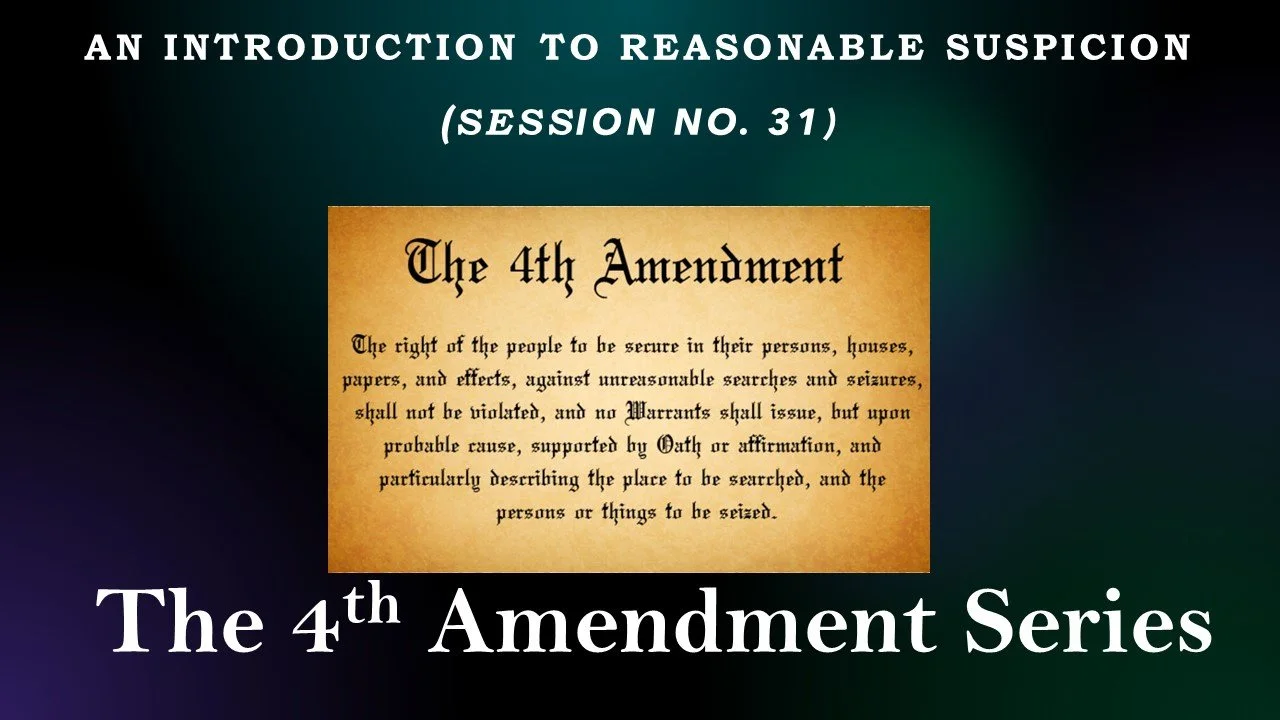The 4th Amendment Series
The Use of Vehicle Trackers (U.S. v. Jones)
[I]n 2012 the Supreme Court decided the case of United States v. Jones, where the Court found that the attachment of a tracker to the Jeep of Mr. Jones constituted a search under the Fourth Amendment
Vehicle Searches
[T]he Supreme Court refined its analysis to a reduced expectation of privacy in the highly regulated and taxed vehicle. That reduced expectation resulted in allowing searches supported by probable cause without a warrant. There is no requirement of exigency for warrantless searches of vehicles…
The Protective Sweep
The Supreme Court has addressed exigencies addressed with arrests. In fact, the Court held, “[I]ncident to the arrest the officers could, as a precautionary matter and without probable cause or reasonable suspicion, look in closets and other spaces immediately adjoining the place of arrest from which an attack could be immediately launched.” Emphasis added.
Emergencies and Exigencies
A close cousin to the searches for evidence under exigency is the emergency doctrine, sometimes called the community caretaking. While the police oftentimes investigate criminal activity, the police are also public safety professionals, protecting the public generally.
Exigent Circumstances Background
If taking the time to obtain a warrant would result in an escape, risk of death, or loss of evidence, then such circumstances are generally considered an “exigent circumstance” which does not require a warrant.
The Fellow Officer (Collective Knowledge) Rule
[T]he fellow officer rule permits “an officer having probable cause or reasonable suspicion [to instruct] another officer to act, even without communicating all of the information necessary to justify the action."
Factors Supporting Reasonable Suspicion (for Interdiction)
There are a number of factors that the courts have repeatedly held to be supportive of reasonable suspicion….It is also important to remember that these factors can be consistent with innocent conduct.
The Anonymous Tip
In Florida v. JL, the Court held that an anonymous tip called in regarding a person carrying a gun was not sufficient, standing alone, for reasonable suspicion. But in Navarette v. California the Court held a call in regarding an erratic driver could in fact by sufficient to conduct a traffic stop.
What Constitutes a Seizure of the Person (The Case of Hodari D)
The Supreme Court declined to recognize threatened detentions under the Fourth Amendment in the case of California v. Hodari D. As such, the 4th Amendment is not implicated until the officer takes custody of the person or the person submits to the officers’ directives.
Unprovoked Flight
[In] Illinois v. Wardlow, where the Supreme Court held that unprovoked flight upon encountering police officers along with the fact the officers were in an known high crime area constituted reasonable suspicion to conduct a stop and frisk.
The Frisk (The Terry Pat Down)
This frisk is a patting down of the exterior of the suspect and can be conducted to the extent to determine if the suspect is armed.
The Length of a Detention & a De Facto Arrest
[J]ust how long can that detention be? Well the answer (in true 4th Amendment fashion) is a reasonable amount of time. How long is reasonable? Well, that will depend on the totality of circumstances…
Investigative Detentions (aka, “The Stop”)
If an officer has “reasonable suspicion” that a crime has been committed or is about to be committed, that officer can seize the person to conduct an investigation to confirm or dispel the officer’s suspicions. You can think of it as freezing everything, maintaining the status quo, for the officer to determine what is going on.
An Introduction to Reasonable Suspicion
[T]he Supreme Court has said that reasonable suspicion is “less demanding standard than probable cause and requires showing considerably less than a preponderance of evidence.” While that is not a percentage, we can say that your suspicion, based on the totality of circumstances, could be wrong a considerable majority of the time.
Probable Cause and Informants
Illinois v. Gates came along in 1983. The Gates case involved a warrant based on a detailed anonymous letter, but a great deal of the information was corroborated by the police. The letter and observations formed the probable cause for a search warrant for the Gates’ residence. In upholding the warrant and supporting probable cause, the Supreme Court abandoned the two part Aguilar-Spinelli Test for the Totality of Circumstances Test.
Probable Cause & Staleness
Staleness is not a separate concept – it is simply an extension of the probable cause concept. At some point, information becomes so old that there is no longer a fair probability the evidence will be found at the location. There are no hard and fast rules for staleness (i.e., the urban legends of the 72 hour, or even 48 hour rule).
How to Apply Probable Cause
Rather than ask, Do I have “PC,” ask yourself, Is there a “fair probability?” In other words, don’t ask, If I find evidence of drug distribution in the trash associated with a house, is there PC for a warrant? Instead ask If I find evidence of drug distribution in the trash associated with a house, based on my training and experience is there a fair probability the house contains evidence of drug distribution?
Probable Cause Defined (“Fair Probability”)
While there is a complicated definition of probable cause, it can and should be simply defined as and thought of a “fair probability.”
Probable Cause Background
Probable cause is not establishing guilt (beyond a reasonable doubt), but it is merely a threshold for government agents to search or seize people or their property.
How to Articulate the Training and Experience (the Expert Officer)
In the world of advocacy and persuasion, visual exhibits are quite effective. So when presenting the expertise of the expert witness, I have found it helpful to create a demonstrative exhibit for the judge or jury. Each fact on this exhibit is sponsored by the testimony, so the exhibit merely reflects the testimony in evidence.



















